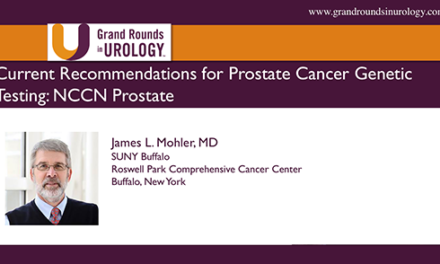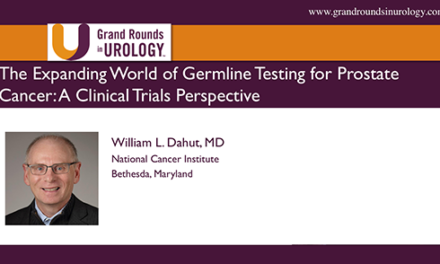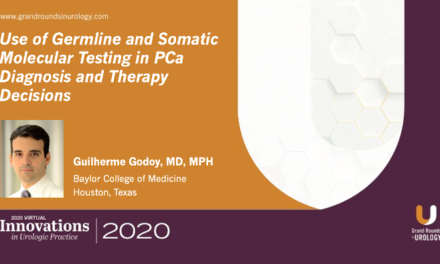E. David Crawford, MD, Editor-in-Chief of Grand Rounds in Urology, and Alan H. Bryce, MD, Chair of the Division of Hematology and Medical Oncology and Assistant Professor of Medicine at the Mayo Clinic in Phoenix, Arizona, presented a Point-Counterpoint on “There is a Role for Currently Available Biomarkers/Genomics in the Risk Stratification of Prostate Cancer” at Perspectives in Urology: Point-Counterpoint 2019 to discuss their differing viewpoints on the relative value of genomics and biomarkers in prostate cancer risk stratification.
After viewing the three presentations, be sure to vote on which presenter’s view you support.
Point-Counterpoint – Pro: There is a Role for Currently Available Biomarkers/Genomics in the Risk Stratification of Prostate Cancer – Summary:
E. David Crawford, MD, Editor-in-Chief of Grand Rounds in Urology, argues that doctors need to do biomarker testing to know which patients to biopsy, follow closely, and treat with radiation. He discusses how doctors should test early for BRCA mutations to know which patients will have more aggressive cancers. Biomarkers are helpful for determining prognosis and management strategy and, therefore, using them may lead to increased survival rates for prostate cancer patients.
Point-Counterpoint – Con: There is a Role for Currently Available Biomarkers/Genomics in the Risk Stratification of Prostate Cancer – Summary:
Alan H. Bryce, MD, Chair of the Division of Hematology and Medical Oncology and Assistant Professor of Medicine at the Mayo Clinic in Phoenix, Arizona, argues that although germline testing is beneficial, other biomarker tests have inconsistent results for prostate cancer patients. These biomarker tests help manage the psychological part of fighting cancer by overcoming indecisiveness and giving patients a false sense of security. He argues that results provided by biomarkers can lead to misinterpretations and, therefore, biomarkers should be evaluated together with other tumor-related features and patient characteristics.
How to cite: Crawford, E. David. Bryce, Alan H. “Point-Counterpoint: There is a Role for Currently Available Biomarkers/Genomics in the Risk Stratification of Prostate Cancer” April, 2020. Accessed Jan 2025. https://dev.grandroundsinurology.com/point-counterpoint-there-is-a-role-for-currently-available-biomarkers-genomics-in-the-risk-stratification-of-prostate-cancer/
[yop_poll id=”4″]
About the Authors
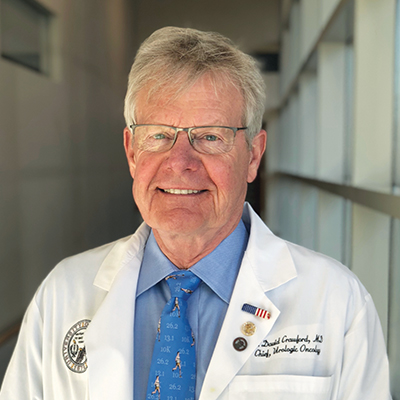
E. David Crawford, MD
E. David Crawford, MD, is an internationally renowned urologist and an expert in benign prostate hypertrophy, urologic cancers, and in particular, prostate cancer. He has authored many scientific articles, as well as textbook and book chapters. He is an editorial reviewer or consultant for many publications, including Urology, the Journal of Urology, and the Journal of Clinical Oncology. Dr. Crawford is a member of many organizations, including the American Society of Clinical Oncology (ASCO), the American Urological Association (AUA), and the American Association for the Advancement of Science (AAAS). He is the Founder and Chairman of the Prostate Conditions Education Council, which is responsible for raising awareness and screening millions of men for prostate health issues. He has received many awards, including the CaP Cure Annual Award for Scientific Presentation, and has twice been presented with a “Freddie Award” for best medical documentary. He has long been recognized as one of the Best Doctors of America, and is recognized by Men’s Health Magazine as one of the top 20 urologists for men in the country.
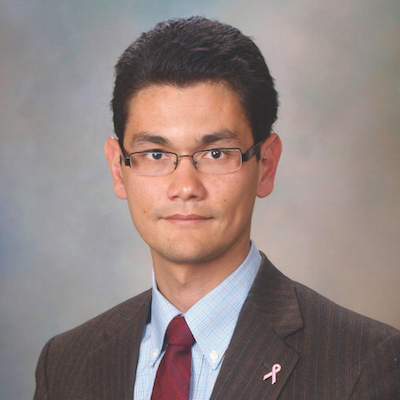
Alan H. Bryce, MD
Dr. Bryce studies cancer genetics and novel therapeutics with a focus on personalized medicine. His clinical practice focuses on genitourinary malignancies (prostate, kidney, bladder, and testicular cancers) and melanoma. He is Chair of the Division of Hematology and Medical Oncology and Assistant Professor of Medicine at Mayo Clinic in Phoenix, Arizona. He is also the Medical Director of the Genomic Oncology Clinic at Mayo Clinic Arizona, where he utilizes whole genome sequencing of tumors to identify key driver mutations. This approach allows for precise targeting of a patient’s tumor, leading to a greater chance of remission. Dr. Bryce participates in community outreach to underserved populations and has in interest in health disparities research. He also conducts Phase I clinical trials of new cancer drugs.
About Perspectives in Urology: Point Counterpoint
Perspectives in Urology: Point Counterpoint (PCP) is an annual, multi-day, CME-accredited conference devoted to discussing and debating the latest topics in men’s health and general urology, as well as management of bladder, renal, and both localized and advanced prostate cancer. More than didactic lectures, the conference’s format includes debates, point-counterpoint discussion panels, and unique case-based presentations. Dr. Crawford and Dr. Bryce presented these lectures during the 28th PCP in 2019. Please visit this page in order to register for future PCP meetings.
ABOUT THE AUTHOR
Dr. Bryce is the Medical Director of the Genomic Oncology Clinic at Mayo Clinic Arizona in Scottsdale, where he utilizes whole genome sequencing of tumors to identify key driver mutations. This approach allows for precise targeting of a patient’s tumor, leading to a greater chance of remission.
Dr. Bryce received a BS in Biochemistry from the University of California, Los Angeles. He then went on to receive his MD from Finch University of Health Sciences/Chicago Medical School. He completed a residency at the Mayo Graduate School of Medicine, and then received a Fellowship in Hematology/Oncology, also at the Mayo Graduate School of Medicine. He eventually served as Chief Fellow of Hematology/Medical Oncology there.
Dr. Bryce studies cancer genetics and novel therapeutics with a focus on personalized medicine. His clinical practice centers on genitourinary malignancies (prostate, kidney, bladder, and testicular cancers) and melanoma. In addition, Dr. Bryce participates in community outreach to underserved populations and has an interest in health disparities research. He also conducts Phase I clinical trials of new cancer drugs.

